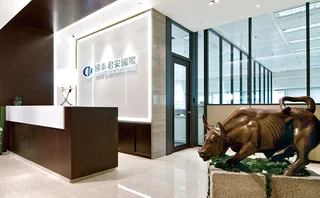
Laying the foundations
The advent of Asia's first property derivatives deal has led some to predict the swift growth of synthetic property transactions in the region. But there are some fundamental issues that may hinder the process, finds Pamela Tang

The property markets in Asia are booming, and property price appreciation has proven a vital source of wealth generation for some of the region's biggest corporations, as well as consumers. But real estate has remained a largely untapped asset class for derivatives dealers, despite the market's potential - in Hong Kong, for example, a total of HK$315 billion ($40.3 billion) in property changed hands in 2006, according to the territory's land registry, a figure that accounts for all building types.
However, that may be about to change. Hong Kong saw the region's first property derivatives deal - a price return swap based on the city's residential property index - between Hong Kong-based financial group Sun Hung Kai Financial (SHKF) and Dutch bank ABN Amro in February. This landmark deal resulted in ABN Amro buying exposure to the city's housing market by paying SHKF the Hong Kong interbank offered rate (Hibor) plus an undisclosed spread for the change in the University of Hong Kong's Hong Kong island residential price index (HKU-HRPI) (see box, Working the index).
The deal, brokered by property derivatives joint venture GFI Colliers, had a one-year tenor and a notional of HK$50 million ($6.4 million). It was a back-to-back deal for SHKF with an undisclosed client with property interests in Hong Kong and elsewhere.
Some dealers and brokers believe Hong Kong's property derivatives debut will lead to a slew of similar trades taking place in the city in the coming six months. They are also bullish about the spread of property derivatives trading to Singapore and Australia.
The National University of Singapore is creating residential indexes for the lion city's housing market, while in Australia, real estate research group Rismark International and property data company RP Data said in February that they would develop an over-the-counter property derivatives market with GFI Group.
Parties actively marketing property derivatives say they expect Asian markets to mirror the growth of the property derivatives market in the UK. The UK market was virtually non-existent in 2004, but saw £4.67 billion ($9.17 billion) in notional traded by the end of 2006, according to the Investment Property Databank, a UK-based research company that provides property benchmarks and indexes.
The UK market is expected to hit £8 billion in trades this year, compared with £3.5 billion traded in 2006, according to ABN Amro - one of a number of dealers aggressively expanding in this area. And dealers reckon that if the growth in trading continues, the annually traded notional turnover in the UK in the synthetic market will match that of the physical market by 2010. They expect the same to happen in Hong Kong in as little as five years.
There is already evidence of a pick-up in interest in Asia. "Just a few weeks after the first deal, we are now working seven firm prices from five different counterparties," says Stephen Moore, head of Asia-Pacific derivatives at GFI Colliers in Hong Kong. "Although the bid/offer spreads - which may vary from 150 to 600 basis points apart - are very wide, I'm happy that we are seeing some activity, and it is a matter of time before that closes and we do another deal."
Attraction
Dealers say property derivatives have several positive features that make them potentially attractive to a wide range of investors, including Asia's numerous property developers. For example, developers that put up a residential sale typically have a long lead time between the start and completion of the project, meaning market fundamentals could change significantly. The idea is that if a property developer expects to see a downward move in prices, it could hedge its risk with a property derivative, such as a price return swap.
"Property developers are likely borrowing at about Hibor plus 50-100bp to fund their construction projects," says GFI Colliers' Moore. "Using a property derivative, they can receive a Hibor-plus-basis-point spread from the buyer, which allows them to net out their Hibor payments and receive anything from 100bp to 700bp in a positive environment. The developer is selling the expectation of the residential property market if that expectation is positive. They will still benefit from the rise of their physical assets and only 'lose' on the derivative once the market rises over and above the traded level."
Some certainly feel property developers will embrace these new instruments. Philip Ljubic, a property derivatives director at ABN Amro in London, says: "Property companies already use derivatives, such as interest rate and currency derivatives, to hedge the respective risks. All a property derivative does is hedge against adverse property movements. Now there is finally a risk management tool for physical property, and, given the volatility of the Hong Kong property market, it is long overdue."
And those risks seem increasingly real, as problems emerge in the sub-prime mortgage market in the US, leading to concerns that US imports may slacken and Asian economies may be negatively affected by declining exports, which in turn may hurt buoyant real estate prices.
But several market participants remain sceptical. "Frankly, I don't see too many of the Hong Kong developers going for it," says a Hong Kong-based fund manager at a fund that specialises in Asian financial markets. "It may find some favour for a residential developer or owner of completed residential property wanting to hedge against the risk of property prices falling, which could adversely affect his development or investment portfolio. But this instrument is expensive insurance."
The price for the swap being quoted in the market is about 10% of the amount of notional required to hedge, says the fund manager. That means that property developers or other parties with a portfolio of residential properties wanting to hedge against the risk of property prices would need to pay almost HK$5 million for every HK$50 million of exposure they want to hedge. Hence the property market would need to fall by more than 10% for them to gain any benefit from taking on this hedging instrument.
"That can easily happen in Hong Kong, and we have witnessed falls of as much as 60% to 70%, but usually over several years, not in one year," says the fund manager. "In some ways, if you believe this is going to be the case, you might find it cheaper and considerably more effective to simply sell short the shares of certain developer stocks in the market. The cost of shorting stocks in this way is much lower, and typically if property prices go down by 10%, stocks would go down by much more, and therefore the investor would make much more from such a short position. Given the high correlation of the Hang Seng Index to property stock movements, it would be even cheaper and still very effective, probably to simply sell short Hang Seng Index futures."
But proponents of real estate derivatives say property derivatives give pure exposure to property prices and are superior to proxy hedges such as shorting equity indexes. "Think about the market in Hong Kong," says Remy Klammers, head of structured products trading for Asia at Lehman Brothers in Tokyo. "A good proxy intuitively could be the Hang Seng Property Index, but you will find no direct correlation between that and the HKU residential property index. Getting exposure through equities is not the most efficient (approach), because there is a lot of equity-specific risk that you don't necessarily find in real estate risk."
Dealers have also suggested that fund managers, such as pension funds or insurance companies, may be interested in buying pure exposure to specific Asian property markets for diversification - because it is often uncorrelated to equity and fixed-income instruments, and also to rebalance the fund's portfolio. Property derivatives, they say, would allow investors to get that exposure easily, without the legal and tax entanglements of buying property.
Although dealers envisage a day where buyers and sellers can freely trade property derivatives globally, they accept there is no secondary market for these instruments. And that's a major stumbling block.
"Property derivatives are not very useful if I can't trade them," says the fund manager. He says open-ended funds, for example, would need to be able to trade in and out of positions, and this is not possible with property derivatives at the moment. "You could buy the swap and hold it till the end of the term, but it is unlikely you would be able to trade it out," he says. "These products have been around for a little while in the UK, and I don't think they are being very actively traded as yet."
However, some dealers argue that the market is still in the nascent stage and point to the swift growth of the UK market in the past couple of years as evidence that liquidity will come. "We obviously want a liquid market in property derivatives, and we are seeing that starting to happen in the UK, which we believe will happen elsewhere," says Ljubic at ABN Amro. "Once we start seeing more participants - such as banks, hedge funds and property players - come into the market, we'll start to see real liquidity."
This view is shared by Sibo Feng, managing director for Pacific Rim structured credit trading for Merrill Lynch in Tokyo. "Naturally, there is a lack of liquidity when any new product or market launches, and this has indeed been the case with a variety of derivatives products," says Feng. "We are committed to building our presence. Banks with global risk-taking platforms will be uniquely well suited to lead in this area."
Ljubic adds that a key driver for liquidity would be getting dealers to warehouse the risk as opposed to them doing back-to-back transactions - that is, buying and selling without taking on risk. "Banks will need to act as market-makers so they can easily conduct trades on behalf of their clients," says Ljubic.
Proponents of property derivatives were also unfazed by the experience in the UK where there are notably more buyers than sellers of property derivatives. Joseph Tong, chief executive for wealth management, capital markets and brokerage at SHKF in Hong Kong, says this may not prove to be the case in Hong Kong, where there are many property developers. "At the moment we are seeing more sell orders, given the uncertain situation in the property market," he says.
And some believe Hong Kong's volatile property market would be an important catalyst to encouraging liquidity. GFI Colliers' Moore says: "In some property markets, the underlying liquidity of the physical property can be questionable, but it is hard to believe that would apply in Hong Kong, given that it is one of the most liquid property markets in the world. The speculative nature of the Hong Kong population combined with their appetite for alternative real estate products lays a good foundation for a liquid market in property derivatives."
WORKING THE INDEX
A vital ingredient to having a vibrant property derivatives market is a reliable and transparent index. And dealers in Hong Kong believe they have found one in the University of Hong Kong's Hong Kong island residential price index (HKU-HRPI), which was used in the first property derivatives deal in the city, done by Sun Hung Kai Financial and ABN Amro. It is one of the three sub-regional indexes that belong to the HKU all residential price index (HKU-ARPI), with the other two representing property in Kowloon and the New Territories, the mainland areas of Hong Kong.
These indexes were created by a research team led by KW Chau, the chair professor of the real estate and construction department at the University of Hong Kong. The indexes are based on repeat sales that track pairs of transactions during the observation period, with the assumption that if the quality of the property remains largely unchanged over the same period of time, the difference in transaction price represents pure price changes.
This method does not require explicit assumptions about the effects of different property attributes on property price, but it demands a lot of data for constructing a reliable index. The repeat transactions represent 20-30% of all property transactions in Hong Kong. Chau says this method is best for Hong Kong, as it has a liquid market with frequent transactions.
The index has a set of transparent sampling rules to ensure consistency and reliability. For example, transactions that have long holding periods - 10 years or more - are eliminated to ensure minimal variation in the quality of transacted properties. Transactions involving short holding periods - where properties are transacted within four months - are also eliminated, as are transaction records that deviate substantially from market prices.
"After we took these transactions out, the index became more stable (historical indexes are not sensitive to future transactions)," says Chau. "There is a give and take to make sure that we do not take away too many transactions, so that the index remains representative."
The index is also restricted to a 10-year rolling period, because the absence of such a limitation would mean the database for index computation would grow without limit over time and so make the index less stable and subject to revision. Index revision means past figures could change over time. "If you want something for derivatives settlement, the trader will not want that to happen," says Chau.
The University of Hong Kong only offers residential indexes, but Chau and his team are working on commercial indexes that use modified hedonic models - which require collection of more detailed information about the property - to build the indexes, as there are too few repeat commercial property transactions to make reliable price indexes.
One of the problems, dealers say, is getting access to that information. "It is very hard getting access to income information and valuation data of buildings without the support of landlords," says Stephen Moore, head of Asia-Pacific property derivatives at GFI Colliers in Hong Kong. "There are arguably too few transactions in the commercial sector here in Hong Kong to build a transaction-based index."
But Moore says this may be set to change. "We are firm supporters of the IPD (Investment Property Databank) valuation-based approach and will assist in every way we can to build a total return index for commercial properties with IPD here in Hong Kong." Moore says talks are ongoing with landlords, and he hopes commercial property derivatives for the Hong Kong market will start trading within 18 months.
Only users who have a paid subscription or are part of a corporate subscription are able to print or copy content.
To access these options, along with all other subscription benefits, please contact info@risk.net or view our subscription options here: http://subscriptions.risk.net/subscribe
You are currently unable to print this content. Please contact info@risk.net to find out more.
You are currently unable to copy this content. Please contact info@risk.net to find out more.
Copyright Infopro Digital Limited. All rights reserved.
You may share this content using our article tools. Printing this content is for the sole use of the Authorised User (named subscriber), as outlined in our terms and conditions - https://www.infopro-insight.com/terms-conditions/insight-subscriptions/
If you would like to purchase additional rights please email info@risk.net
Copyright Infopro Digital Limited. All rights reserved.
You may share this content using our article tools. Copying this content is for the sole use of the Authorised User (named subscriber), as outlined in our terms and conditions - https://www.infopro-insight.com/terms-conditions/insight-subscriptions/
If you would like to purchase additional rights please email info@risk.net
More on Structured products
A guide to home equity investments: the untapped real estate asset class
This report covers the investment opportunity in untapped home equity and the growth of HEIs, and outlines why the current macroeconomic environment presents a unique inflection point for credit-oriented investors to invest in HEIs
Podcast: Claudio Albanese on how bad models survive
Darwin’s theory of natural selection could help quants detect flawed models and strategies
Range accruals under spotlight as Taiwan prepares for FRTB
Taiwanese banks review viability of products offering options on long-dated rates
Structured products gain favour among Chinese enterprises
The Chinese government’s flagship national strategy for the advancement of regional connectivity – the Belt and Road Initiative – continues to encourage the outward expansion of Chinese state-owned enterprises (SOEs). Here, Guotai Junan International…
Structured notes – Transforming risk into opportunities
Global markets have experienced a period of extreme volatility in response to acute concerns over the economic impact of the Covid‑19 pandemic. Numerix explores what this means for traders, issuers, risk managers and investors as the structured products…
Structured products – Transforming risk into opportunities
The structured product market is one of the most dynamic and complex of all, offering a multitude of benefits to investors. But increased regulation, intense competition and heightened volatility have become the new normal in financial markets, creating…
Increased adoption and innovation are driving the structured products market
To help better understand the challenges and opportunities a range of firms face when operating in this business, the current trends and future of structured products, and how the digital evolution is impacting the market, Numerix’s Ilja Faerman, senior…
Structured products – The ART of risk transfer
Exploring the risk thrown up by autocallables has created a new family of structured products, offering diversification to investors while allowing their manufacturers room to extend their portfolios, writes Manvir Nijhar, co-head of equities and equity…
Most read
- Top 10 operational risks for 2024
- Top 10 op risks: third parties stoke cyber risk
- Japanese megabanks shun internal models as FRTB bites







